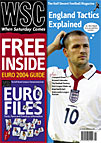 A half-time team-talk is maybe all that was needed to save this play from what, on the evidence of it's first-half showing, looked to be a thrashing at the hands of the critics. Barney Ronay explains why
A half-time team-talk is maybe all that was needed to save this play from what, on the evidence of it's first-half showing, looked to be a thrashing at the hands of the critics. Barney Ronay explains why
Some things have no place in football. These include racism, violence and the theatre. Sing Yer Heart Out for the Lads, Roy Williams’ new play at the National Theatre, is effectively two separate plays in two acts. The first is about football and is terrible. All the action takes place in a south London pub. It’s a convincing reproduction, down to the red-patterned carpet and Sunday roast for £3.75. The only false note is the cluster of young professionals sitting at the tables, although these turn out to be members of the audience roped in to the set.
It’s the day of England’s World Cup qualifier with Germany in 2000. The landlady is finding the game on the pub’s big screen, aided by her slouching, tracksuited dad. There is braying laughter at the first “fuck” and the first “shit”. The only word the audience won’t laugh at, it turns out, is “cunt”, which features a lot. “Kevin Keegan is a fucking wanker,” the dad declares as Richard Keys’ enormous face appears. He then launches into a rant about Keegan’s use of the “foreign” 3-5-2 formation as opposed to a more native 4-4-2. Presumably the xenophobia antenna are supposed to start twitching, but one of the complaints about Keegan was his adherence to 4-4-2. He started with a 4-4-2 against Germany before switching at half-time, so this just sets a tone of fumbling inaccuracy.
By now half the pub’s team are here, led by captain Lawrie, a large, cartoonish skinhead, who starts a very boring discussion about football, played for slapstick laughs. Before long Lawrie is gleefully recounting a Nazi-inspired Jew-baiting incident in “Charelery” during Euro 2000. We’re being invited to feel a shiver of something – titillation, a good old laugh at the oiks? – as the racial epithets are rolled out. There’s a faint stench, not just of bad art, but of the voyeurism sometimes associated with portraying the gurning working class for the amusement of a bunch of theatregoers.
More men burst in. Their ringleader appears to be the bloke from EastEnders who used to go out with Barbara Windsor and who still can’t move his facial muscles properly. They shout a lot and jump around like primates, revealing themselves to be buffoons and racists. Soon they’re mooning at the TV screen. These, you see, are football fans. There are titters from the audience. By now a black member of the pub team, Barry, has appeared, announcing his arrival by singing the entire John Barnes rap from World In Motion. A bad football discussion about Andy Cole follows (needs five chances to score a goal etcetera) that tries, unconvincingly, to suggest that Cole’s poor form and eventual replacement by Emile Heskey had something to do with racism. “Fuck off Nazi cunt” the football fans shout as Rudi Völler appears on screen. They perform Nazi salutes during the German national anthem. From the audience there is indulgent giggling. Meanwhile Barry’s elder brother has arrived. He’s not really into football. He dresses better and can speak properly too. “I feel sick just being here,” he remarks. I’m starting to agree.
The second half of the play is very different. Most strikingly, it’s actually quite good. This is because it doesn’t have much football in it. It’s obvious that Williams has nothing much to tell us about the game, but he does something to say about race. There are absorbing scenes about the relationship between the two black brothers and about the interaction between the chief yob and a white supremacist sergeant major. We even have the play’s sole interesting point about football. The bloke from EastEnders tells Barry he shouldn’t support Manchester United. “You should support your local team. They’re your blood, your family.” But of course, if you’re Barry they’re not. He asks him where he was born. “Shepherds Bush.” “You should support QPR, then.” But it’s not like that in London. The proud boast of the fan – my dad and my grandad both stood on this terrace – is also a dead end when it comes to integration. Here at last Williams is telling us something about football that we might need to know, something that you sense is personally felt.
Elsewhere you just wonder what, exactly, football is doing here. Perhaps Williams needed football to propel his work on to the National Theatre stage. Maybe this is why we have an unintentional shoe-horning of other kinds of prejudice – to do with class and the traditional lumping together of bigots and fans – into what, in its authentic moments, seems to be a play about something else altogether.
From WSC 209 July 2004. What was happening this month